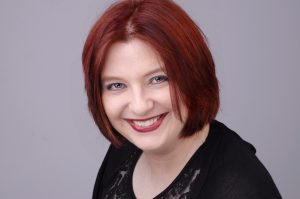Each day in April, in honor of National Poetry Month and our third anniversary issue (find out how to get a copy HERE), we are running an interview with a poet who has been published in Gyroscope Review. Read on.
National Poetry Month Interview Series: Interview with Poet Deborah L. Davitt

How will you celebrate National Poetry Month? By writing more poetry, of course!
Pen, pencil or computer first? Computer, 95% of the time. Words just flow out of me more easily this way, and it’s easier to move them around, folding and spindling them around meaning, like origami. On paper, there’s all that ugly scratching out.
Who/what are your influences? I’ve read and translated Beowulf out of Ango-Saxon, read Chaucer in Middle English, and studied Shakespeare, Spenser, Keats–all of them. But I don’t write the way they do. I’ve had an editor tell me, “This was a lovely take on X, but it’s not as good as Keats’ version,” and I went, “I don’t lace up my shoes to compete against Keats.” No one really can, because the expectations we have of verse are infinitely different these days. The work we expect poetry to do is different, and we have to work for an audience these days.
What topic is the hardest for you to write about and why? Politics, which is something I avoid discussing anyway. Unfortunately, if you throw a rock out a window, you’ll hit a topic that’s been politicized these days.
What was the worst writing idea you ever had? My first novel, when I was 18. I reread it three months after I wrote it, decided it was derivative crap, and was mostly relieved when the files got lost between computers.
What authors do you love right now? Oddly, for sure beauty of language, I often find myself returning to Clive Barker’s prose works, like Galilee. There’s something hypnotic in them.
What is the most important role of poets in 2018? Other people will probably have more inspiring things to say about this, but I think that poets need to be ambassadors for poetry. Willing to reach out to people and show that poetry isn’t just written solely for other poets, or for academics. That it doesn’t have to be the terrifying, boring stuff tossed at kids in high school, to which so many of them never return, because it was stultifyingly dull, and presented in much the same way as dissecting a frog: ‘Now, we come to the poem’s colon–er, coda, I mean. Please snip it out and pin it to your examination paper . . . ” We need to show people that poetry can be for everyone, not just for the elite few.
People these days are reading less and less, and thinking less and less critically as a result. If poetry can turn that tide, by being something that can catch the damselfly attention-span of an online reader? If it can engage the mind and maybe draw that reader into reading more? That’s a win I’d be happy with.
Where do you go when you need to recharge? I recharge when everyone else has left the house, to be honest. I’m a wife and a mother, and a day when my son is at school and the school hasn’t called me . . . is a really good day.
What is your favorite end-of-the-day drink? Hot peach tea.
Deborah L. Davitt lives in Houston, Texas. Find out more about her work at her website, www.edda-earth.com.